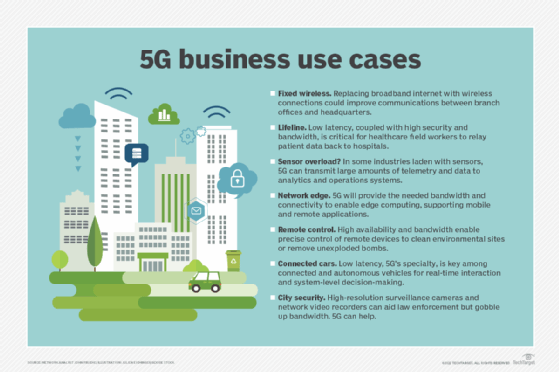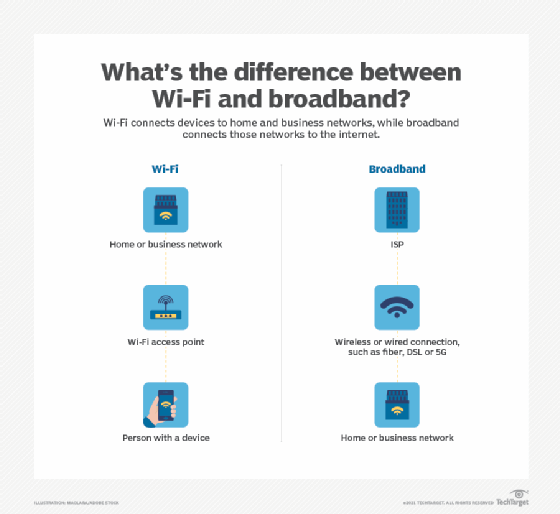fixed wireless
What is fixed wireless?
Fixed wireless networking refers to the operation of wireless devices in fixed locations such as homes and offices. Fixed wireless devices usually derive their electrical power from utility mains, unlike mobile wireless devices, which tend to be battery powered.
Fixed wireless is the typical form of internet deployed in areas with no fiber internet infrastructure, mainly rural areas.
Although mobile and portable systems can be used in fixed locations, efficiency and bandwidth are compromised compared with fixed systems. Mobile or portable battery-powered wireless systems can serve as emergency backups for fixed systems in case of a power blackout or natural disaster.
How does fixed wireless internet work?
Fixed wireless internet is broadcast from towers through airwaves to receivers that the service provider will have installed on the user's property. For fixed wireless internet connections to work, the receiver needs to be within around 10 miles from the fixed wireless internet service provider's tower.
High-end fixed wireless employs fixed wireless broadband modems that bypass the telephone system and offer internet access hundreds of times faster than twisted-pair hard-wired connections for a telephone or cellphone connection modems.
Some of the most important benefits of fixed wireless are as follows:
- Subscribers can be added or moved to a certain extent without modifying the network infrastructure.
- Subscribers in remote areas can be brought into a network without the need for stringing new cables or optical fiber across the countryside.
- Broad bandwidth is possible because there are no wires or cables to introduce reactance into the connection. Reactance limits bandwidth by preventing signals higher than a certain frequency from efficiently propagating.
- As the number of subscribers increases, the connection cost per subscriber goes down making this a more cost-effective option.
Fixed wireless and 5G
The latest cellular-wireless standard, 5G, has a number of use cases. Among these are mobile backhaul, support for autonomous vehicles and fixed wireless -- essentially, replacing broadband internet such as Wi-Fi with a fixed wireless connection.
Fixed 5G wireless promises improved quality of service and more bandwidth for enterprise applications crossing over to cellular networks -- especially important as organizations expand work-from-home options for employees -- and greatly increases the use of software-defined WANs.
It will also make it easier to keep branch locations connected to head offices for mobile environments and remote sites, multi-tenancy situations and retail settings.

Fixed wireless vs. satellite internet
Rural areas and other often underserved areas have another internet option: satellite internet. While fixed wireless internet requires an antenna to receive a signal from a tower 10 miles or so away, satellite internet requires a dish to be installed at the user's property to receive satellite internet signals.
Unlike fixed wireless internet, satellite internet is often affected by weather conditions because the signal travels through many miles of atmosphere to get to the user's receiving dish.
Fixed wireless vs. Wi-Fi
Wi-Fi uses the IEEE 802.11 standards to connect devices on a Wi-Fi network and transmit data via radio waves among those devices. Many radio frequency bands are available for Wi-Fi use, including 2.4 GHz, 5 GHz and 6 GHz. Wi-Fi networks typically use access points (APs) to provide wireless connectivity to devices such as mobile phones, IoT devices and laptops.
Wi-Fi devices receive internet signals from an internet service provider (ISP), usually via a modem or wireless router. Antennas on those devices receive the signal and translate it into radio signals to distribute across the network. The Wi-Fi network functions as a wireless LAN for the nearby area that devices can tap into via wireless or a direct wired connection. Additionally, Wi-Fi can function alongside other methods of connectivity, such as DSL, cable or fiber.
Fixed wireless is one method to deliver internet connections to wireless routers, APs or modems used for Wi-Fi, but it is not a replacement for a Wi-Fi network altogether. Organizations, businesses or homes that run fixed wireless internet can't automatically connect to the receiver antenna to give their devices internet access. Instead, that fixed wireless receiver has to connect to an internet modem or router, which powers the Wi-Fi network on which devices connect.

How reliable is fixed wireless internet?
Under the right conditions, fixed wireless internet can be highly reliable. There are two main factors that determine fixed wireless internet reliability and performance: the service provider's network capacity and congestion, and installation quality control. If a fixed wireless service provider has overloaded its network, a customer's internet connection speed will be low, especially during peak hours. That's why it is important to ask the provider about their network capacity and whether they've put in place specific measures that ensure speeds remain consistently reliable both night and day.
In addition, customers should ensure that the internet provider puts certain installation quality control protocols in place, including a line of sight to the nearest transmitter tower if possible. The installation team should be on the lookout for radio frequency interference and physical objects that could interfere with the signal's strength and quality, including power and cable lines, trees and buildings.
A high quality fixed wireless installation can provide very high internet and download speeds, sometimes as high as 1 Gbps. That said, the internet vendor will usually offer speeds based on the customer's plan of choice or whether it's a commercial plan or an internet plan for residential buildings. Customers should understand their internet needs to help them determine the optimal plan where the network performs well without excess spending on internet bills.
The vendor typically owns the fixed wireless technology infrastructure. Therefore, it is responsible for the following tasks to ensure strong performance for the fixed wireless customers:
- operating and maintaining the network;
- limiting the number of customers that can connect to the network; and
- preserving a low contention ratio, meaning it must maintain high network capacity and a relatively small number of subscribers for every tower.
Does weather affect fixed wireless internet?
Generally speaking, fixed wireless internet should not be affected by bad weather, except in cases such as heavy storms and extreme hail. Today's fixed wireless service providers use a frequency that is hardly affected by most weather conditions.
What's more, many vendors' fixed wireless services are backed by hundreds of kilometers of high-capacity fiber with layers of self-healing rings that ensure few service interruptions. When one link goes down, the data reroutes, thereby avoiding interruption of service.
Is fixed wireless internet good for gaming?
Compared to satellite internet, fixed wireless suffers from less latency, making it a viable fit for online gaming. Satellite internet signals, essentially coming from high in space, will cause gamer videos to buffer and games to lag as the computer struggles to establish a connection signal.
Also, satellite internet vendors set data caps to limit the amount of data allowable per user each month. Satellite internet providers will typically lower a customer's internet speeds to 1-3 Mbps once the user surpasses the set cap. Wireless internet providers are more likely to have higher caps or no caps.
In addition, satellite internet usually costs more than fixed wireless internet. This means satellite internet is used as a last resort, when it's impossible to connect to either fixed wireless or wired broadband.







